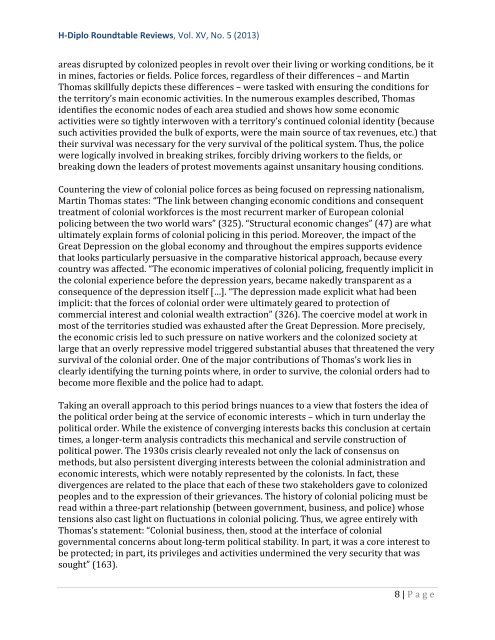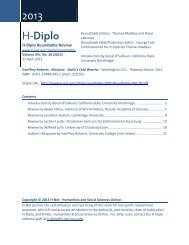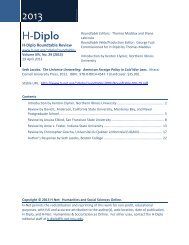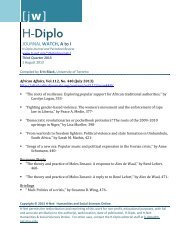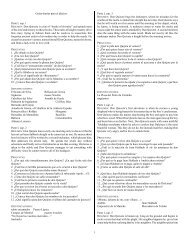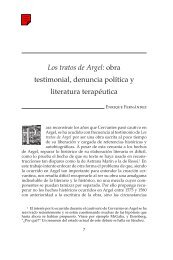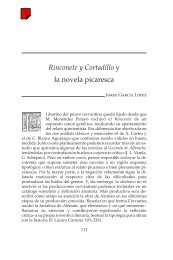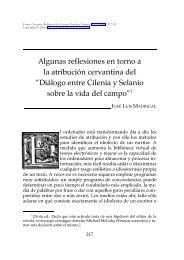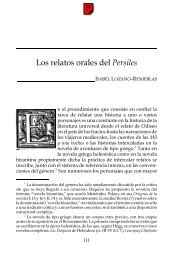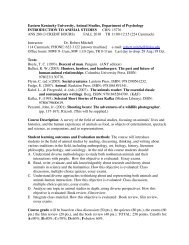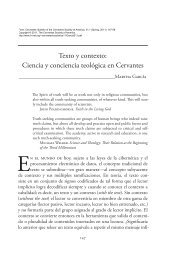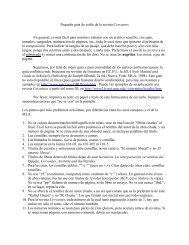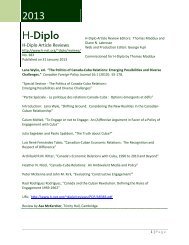H-Diplo Roundtable on Martin Thomas. Violence and ... - H-Net
H-Diplo Roundtable on Martin Thomas. Violence and ... - H-Net
H-Diplo Roundtable on Martin Thomas. Violence and ... - H-Net
Create successful ePaper yourself
Turn your PDF publications into a flip-book with our unique Google optimized e-Paper software.
H-<str<strong>on</strong>g>Diplo</str<strong>on</strong>g> <str<strong>on</strong>g>Roundtable</str<strong>on</strong>g> Reviews, Vol. XV, No. 5 (2013)<br />
areas disrupted by col<strong>on</strong>ized peoples in revolt over their living or working c<strong>on</strong>diti<strong>on</strong>s, be it<br />
in mines, factories or fields. Police forces, regardless of their differences – <strong>and</strong> <strong>Martin</strong><br />
<strong>Thomas</strong> skillfully depicts these differences – were tasked with ensuring the c<strong>on</strong>diti<strong>on</strong>s for<br />
the territory’s main ec<strong>on</strong>omic activities. In the numerous examples described, <strong>Thomas</strong><br />
identifies the ec<strong>on</strong>omic nodes of each area studied <strong>and</strong> shows how some ec<strong>on</strong>omic<br />
activities were so tightly interwoven with a territory’s c<strong>on</strong>tinued col<strong>on</strong>ial identity (because<br />
such activities provided the bulk of exports, were the main source of tax revenues, etc.) that<br />
their survival was necessary for the very survival of the political system. Thus, the police<br />
were logically involved in breaking strikes, forcibly driving workers to the fields, or<br />
breaking down the leaders of protest movements against unsanitary housing c<strong>on</strong>diti<strong>on</strong>s.<br />
Countering the view of col<strong>on</strong>ial police forces as being focused <strong>on</strong> repressing nati<strong>on</strong>alism,<br />
<strong>Martin</strong> <strong>Thomas</strong> states: “The link between changing ec<strong>on</strong>omic c<strong>on</strong>diti<strong>on</strong>s <strong>and</strong> c<strong>on</strong>sequent<br />
treatment of col<strong>on</strong>ial workforces is the most recurrent marker of European col<strong>on</strong>ial<br />
policing between the two world wars” (325). “Structural ec<strong>on</strong>omic changes” (47) are what<br />
ultimately explain forms of col<strong>on</strong>ial policing in this period. Moreover, the impact of the<br />
Great Depressi<strong>on</strong> <strong>on</strong> the global ec<strong>on</strong>omy <strong>and</strong> throughout the empires supports evidence<br />
that looks particularly persuasive in the comparative historical approach, because every<br />
country was affected. “The ec<strong>on</strong>omic imperatives of col<strong>on</strong>ial policing, frequently implicit in<br />
the col<strong>on</strong>ial experience before the depressi<strong>on</strong> years, became nakedly transparent as a<br />
c<strong>on</strong>sequence of the depressi<strong>on</strong> itself […]. “The depressi<strong>on</strong> made explicit what had been<br />
implicit: that the forces of col<strong>on</strong>ial order were ultimately geared to protecti<strong>on</strong> of<br />
commercial interest <strong>and</strong> col<strong>on</strong>ial wealth extracti<strong>on</strong>” (326). The coercive model at work in<br />
most of the territories studied was exhausted after the Great Depressi<strong>on</strong>. More precisely,<br />
the ec<strong>on</strong>omic crisis led to such pressure <strong>on</strong> native workers <strong>and</strong> the col<strong>on</strong>ized society at<br />
large that an overly repressive model triggered substantial abuses that threatened the very<br />
survival of the col<strong>on</strong>ial order. One of the major c<strong>on</strong>tributi<strong>on</strong>s of <strong>Thomas</strong>’s work lies in<br />
clearly identifying the turning points where, in order to survive, the col<strong>on</strong>ial orders had to<br />
become more flexible <strong>and</strong> the police had to adapt.<br />
Taking an overall approach to this period brings nuances to a view that fosters the idea of<br />
the political order being at the service of ec<strong>on</strong>omic interests – which in turn underlay the<br />
political order. While the existence of c<strong>on</strong>verging interests backs this c<strong>on</strong>clusi<strong>on</strong> at certain<br />
times, a l<strong>on</strong>ger-term analysis c<strong>on</strong>tradicts this mechanical <strong>and</strong> servile c<strong>on</strong>structi<strong>on</strong> of<br />
political power. The 1930s crisis clearly revealed not <strong>on</strong>ly the lack of c<strong>on</strong>sensus <strong>on</strong><br />
methods, but also persistent diverging interests between the col<strong>on</strong>ial administrati<strong>on</strong> <strong>and</strong><br />
ec<strong>on</strong>omic interests, which were notably represented by the col<strong>on</strong>ists. In fact, these<br />
divergences are related to the place that each of these two stakeholders gave to col<strong>on</strong>ized<br />
peoples <strong>and</strong> to the expressi<strong>on</strong> of their grievances. The history of col<strong>on</strong>ial policing must be<br />
read within a three-part relati<strong>on</strong>ship (between government, business, <strong>and</strong> police) whose<br />
tensi<strong>on</strong>s also cast light <strong>on</strong> fluctuati<strong>on</strong>s in col<strong>on</strong>ial policing. Thus, we agree entirely with<br />
<strong>Thomas</strong>’s statement: “Col<strong>on</strong>ial business, then, stood at the interface of col<strong>on</strong>ial<br />
governmental c<strong>on</strong>cerns about l<strong>on</strong>g-term political stability. In part, it was a core interest to<br />
be protected; in part, its privileges <strong>and</strong> activities undermined the very security that was<br />
sought” (163).<br />
8 | P age


